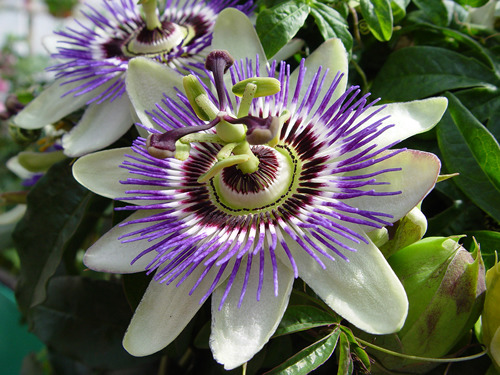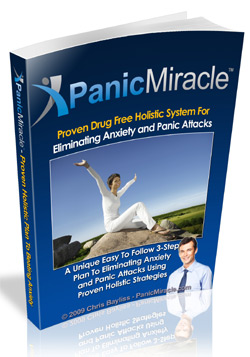
Panic attacks occur suddenly without any warning. They can last for just a few minutes or more. They rarely persist for more than an hour. Recurring attacks may lead a person to avoid situations or places where they have had them, when in fact there is rarely a correlation between the activity or place and such attacks.

Along with anxiety and fear, panic attacks can have physical symptoms like chest pain or discomfort, shortness of breath, hyperventilation, rapid heartbeat, sweating, trembling, hot or cold flashes, nausea, numbness or tingling sensations, or a choking feeling in the throat.
Some people also describe feeling as if they might die or feeling unreal and detached from their surroundings. A person may feel fatigued and worn out after a panic attack subsides.
The exact cause of panic attacks is not known. However, it may have a genetic component and factors like excessive stress can trigger attacks. Additional risk factors include a history of childhood abuse, experiencing a traumatic event, pregnancy and the death of a loved one.
For frequent and recurring panic attacks, proper diagnosis and treatment is a must. Left untreated, panic attacks can take a toll on your emotional as well as physical health. There are also some simple techniques that can help.
Here are the top 10 ways to deal with panic attacks.
1. Slow Breathing
You can put an end to a panic attack before it starts by practicing proper breathing techniques. When more oxygen enters the body, it has a calming effect on your mind and body. Slow, deep breaths can ease many of the symptoms of a panic attack. Plus, practicing breathing exercises and techniques daily can help prevent panic attacks.

- Sit in a relaxing position and try to relax your muscles.
- Breathe in deeply through your nose.
- Next, breathe out slowly through your mouth.
- At the same time, focus on the word “calm”.
- Repeat until you feel relaxed and calm down.
2. Chamomile
A study published in the Journal of Clinical Psychopharmacology found that chamomile can reduce symptoms of mild to moderate Generalized Anxiety Disorder. Chamomile is a rich source of calcium and magnesium, two important nutrients that help ease the severity of panic attacks.

- Add two teaspoons of dried chamomile flowers to a cup of hot water. Cover and steep for 10 minutes. Strain, add some honey and drink it. Try to drink two cups of chamomile tea daily to promote relaxation and prevent panic attacks.
- Alternatively, you can take chamomile supplements (400 to 1,600 milligrams). Consult your doctor for the proper dosage.
3. Valerian
Another popular herbal treatment for panic attacks is valerian, which helps calm the nerves. A study conducted by the National Phobics Society found that valerian can help reduce the symptoms of panic attacks. Plus, it promotes sleep.

- Soak two teaspoons of chopped valerian root in cold water for eight to 10 hours. Strain the water and sip it throughout the day.
- Alternatively, take 400 to 900 milligrams of valerian extract a few hours before going to bed. Consult a doctor for the proper dosage.
4. Ginseng
Being an adaptogen, ginseng can also be used to cure panic attacks. It has been found that people who take ginseng can cope better with adverse conditions because it helps reduce the intensity of the body’s response to stressors. Plus, it has a relaxing effect on the nerves.
- Simmer five to eight thin slices of ginseng in three cups of water for 15 minutes on low heat. Strain, add a little honey and drink it when it is cool. Drink one to three cups of ginseng tea daily as needed.
- A ginseng supplement can also also help prevent panic attacks. Consult your doctor for proper dosage.

Note: Avoid ginseng if you are taking high blood pressure medication.
5. Hot Bath
A hot bath or shower can help provide immediate relief from a panic attack. Hot water has a relaxing effect on the body, helps combat stress and promotes better sleep.
- In a bathtub filled with hot water, add a few drops of any essential oil of your choice like lavender, chamomile or rose oil.
- Also add some carrier oil like jojoba oil.
- Soak in this relaxing bath for 15 to 20 minutes.
- Follow this remedy whenever you are stressed or having a panic attack.
6. Massage
Give yourself a massage daily can help reduce the intensity as well as frequency of panic attacks. The whole process of massage helps calm the nerves and keep your mind more relaxed.
For massage, use aroma-producing oils (essential oils) from plants to promote relaxation. You can use oils like sesame, olive or coconut oil for this purpose.
- Slightly warm the oil of your choice.
- Use the warm oil to massage your shoulders, neck, back and bottom of your feet.
- Massage your body daily or as needed.
Therapies Relaxing - therapies like yoga and meditation can also help you deal with panic attacks. These type of therapies elevate the levels of “feel good” hormones like serotonin in your body. This in turn helps your body deal with stressful events, thus preventing panic attacks. Plus, these therapies are beneficial for your overall health.

To reap the benefits of yoga and meditation, you must do it on regular basis and in the correct way. Seek the help of a yoga expert to learn the correct postures and techniques.
8. Green Tea
Green tea is good for your mind as well as your body. This healthy beverage has many necessary vitamins and minerals that help treat panic attacks. According to a study published in 2009 in The American Journal of Clinical Nutrition, green tea may help reduce stress, too. Plus, it helps boost your mood and increase mental focus.

- Add two teaspoons of green tea leaves to a cup of hot water.
- Cover and steep for five minutes.
- Strain and add some lemon juice and honey.
- Drink this tea two or three times a day.
9. Passion Flower
Many herbalists believe that passion flower is very effective for treating panic attacks. This herb contains flavonoids like chrysin and benzoflavone that help increase the amount of gamma aminobutyric acid (GABA) in the brain. This in turn helps decrease anxiety as well as stress.
Passion flower is available in the market in tea, tincture or capsule form. It is recommended to take this herb under the supervision of an herbalist.

Note: You must not take this herb in excess as it can also disrupt mental and motor functions. Also, this herb is not recommended for pregnant and breastfeeding women.
10. Exercise Daily
Many studies have proven that regular exercise is an excellent treatment for panic attacks. In fact, people who exercise regularly experience fewer panic attack symptoms than those who do not exercise.
Exercise helps reduce the stress hormones and increase the “feel good” hormones in your body. Plus, exercise will allow your body to use the energy that may be contributing to panic feelings.

Regular exercise, particularly aerobic exercise, for 30 minutes daily will help reduce stress. Even walking (as fast as you can) daily can help.
Additional Tips
- Reduce your intake of alcohol, caffeine, sugar and foods that are high in fat.
- Eat more fresh fruits and vegetables.
- Sleep better by following a strict sleep routine.
- Individual and family therapy may help.
- Join a support group. Do not expect yourself to handle it alone.
- Use stress management methods if your panic attacks are related to excessive tension.
- Take more breaks from day-to-day life. Go for short weekend breaks or a holiday with your family and friends.
- Consider keeping a pet to give you company and keep yourself busy.
- Keep a journal to help deal with your feelings and track stressors that trigger your panic attacks so that you can manage them.
- Get out and enjoy nature. Taking a walk through a park can help you feel better.
- When you feel a panic attack coming on, try drinking a glass of cold water to help relax you.
- Consider taking nutritional supplements with B vitamins, magnesium and antioxidant vitamins.
Resources:
http://www.dailymail.co.uk/health/article-88091/How-beat-panic-attacks.html
http://www.ncbi.nlm.nih.gov/pmc/articles/PMC3600416/
http://www.sciencedaily.com/releases/2011/07/110712122403.htm














Post a Comment